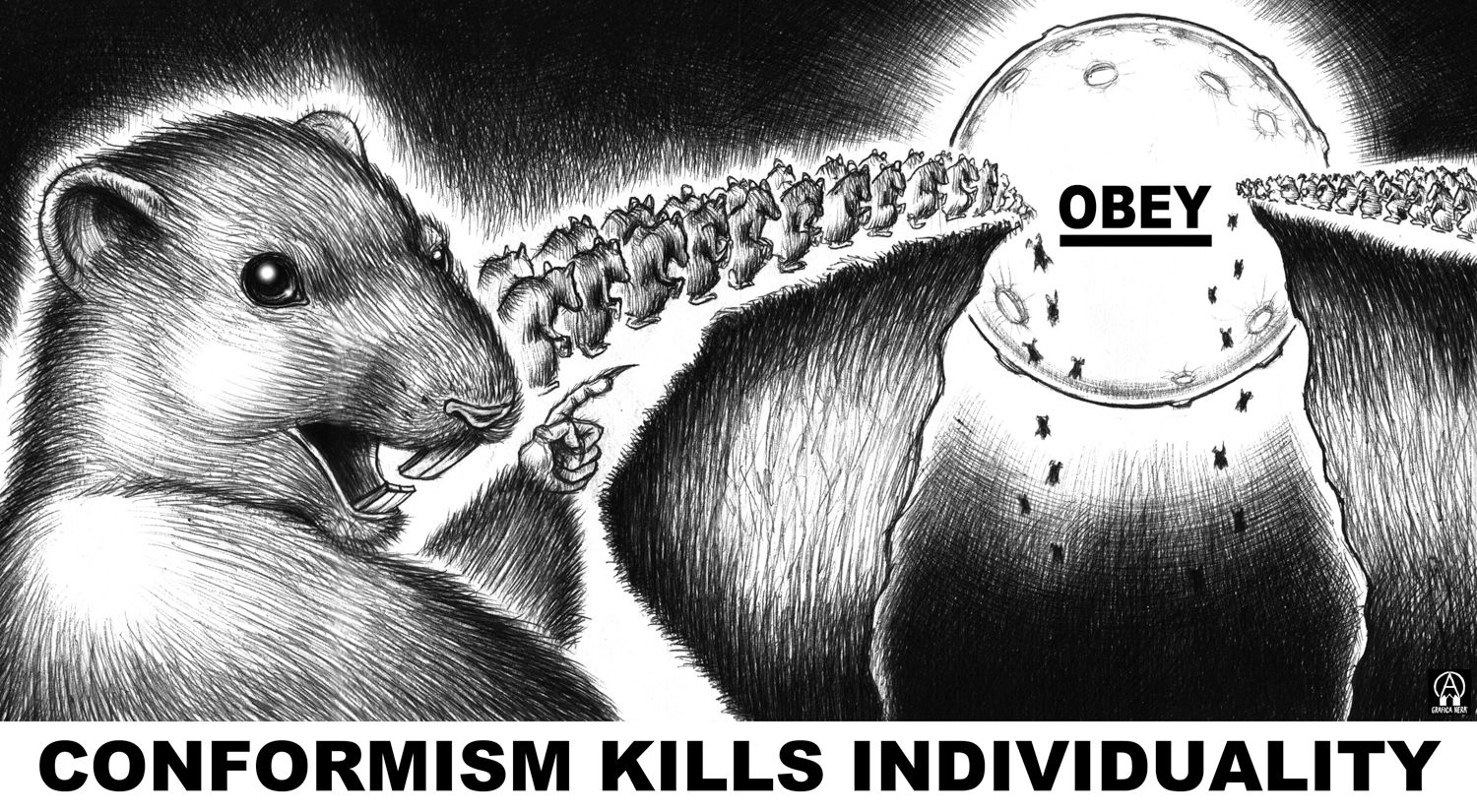Conformism: Or How We Lose Our Identity To Fit In
Admit it or not, we all want to be a part of a group. But what can be the consequences of trying to fit in? Is losing our identity just to be a part of something worth it?
Conformity is known to be the act of matching attitudes, beliefs, and behaviors to group norms. It is a kind of mechanism that helps us fit among others, but if we overdo it we won't become popular and loved, but ... invisible. By obeying the group norm through a purposeful change of behavior, the person is deprived of his own dynamics and appearance. Conformity occurs only in the interaction of the personality with the other members of the group. For it to emerge, there needs to be a real conflict situation in which the individual's opinion does not match that of the group.

Studies
Jenness (1932) was the first psychologist to study conformity. His experiment was a situation involving a glass bottle filled with beans. He asked participants individually to estimate how many beans the bottle contained. Jenness then put the group in a room with the bottle, and asked them to provide a group estimate through discussion. Participants were then asked to estimate the number on their own again to find whether their initial estimates had altered based on the influence of the majority. Jenness then interviewed the participants individually again, and asked if they would like to change their original estimates, or stay with the group's estimate. Almost all changed their individual guesses to be closer to the group estimate.
However, perhaps the most famous conformity experiment was by Solomon Asch (1951) and his line judgment experiment. Solomon Asch is an American psychologist of Jewish origin who is one of the first researchers of social psychology. Asch's definition of conformism is as follows: the tendency of the individual to agree with the group whose members unanimously give the wrong answer to a task with unambiguous solution. This task with an unambiguous solution is known as the Asch Paradigm. There are two vertical lines on two separate boards. One contains a standard line. The other panel has three lines: one with length of the standard, the other longer and the third shorter. The question is “Which of the lines is equal to the length of the standard?”
The participants - 8 male students and one who doesn’t know about the experiment - are placed in a semicircle in front of a board. Each participant is asked to say which line between the samples is equal to the standard. The experiment is set so that the studied one can hear seven opinions before sharing his. Opinions that deliberately picked a false line, although they obviously didn’t correspond to the truth. After 18 sessions the results of this study are more than unequivocal - among many people, the propensity to conformism is stronger than their personal opinion.
Conformism can lead to the fact that a person, even realizing the infidelity of his actions, does them because the group does it. At the same time, it’s obvious that without conformism, a cohesive group can’t be created, there can be no balance in the relationship between the man and the group. If a person is in a non-conformist position, he can’t become a full member of the group and at a certain stage of the conflict between him and the group he must leave it.
Types of Conformity
Kelman (1958) distinguished between three different types of conformity:
- Compliance
This occurs 'when an individual accepts influence because he hopes to achieve a favourable reaction from another person or group. He adopts the induced behavior because....he expects to gain specific rewards or approval and avoid specific punishment or disapproval by conformity' (Kelman, 1958, p. 53).
In other words, conforming to the group even though you don't really agree with them. The compliance stops when the person is not in the group. Therefore, it is a temporary behavior change.
- Internalisation
This occurs 'when an individual accepts influence because the content of the induced behavior - the ideas and actions of which it is composed - is intrinsically rewarding. He adopts the induced behavior because it is congruent [consistent] with his value system' (Kelman, 1958, p. 53).
This involves public and private conformity. A person publicly changes his opinion to be able to fit in the group and also agrees with them privately. The change in behavior is permanent as the beliefs of the group become part of the individual's own belief system.
- Identification
This occurs 'when an individual accepts influence because he wants to establish or maintain a satisfying self-defining relationship to another person or group' (Kelman, 1958, p. 53).
An individual conforms to the expectations of a social role. This is similar to the compliance as there doesn't have to be a private change.
Factors that can lead to conformity
It has been proved that the unanimity of the group and its dimensions prompt a person to conform. Big groups and unanimity can exert pressure on man.
Research has shown that social support reduces compliance. This means that if there is a single connoisseur to us, it can substantially reduce our susceptibility to group influences and pressures. The emerging ally reduces our fear of the possible rejection that we think may follow because of our "diversion".
The relationship between the person and the group influences the process of conformation. These include the extent to which he feels attracted and accepted by the group, its status, the level of interdependence.
The admission of one person in the group is also dependent on his/her status. Simply put, people with a higher status are accepted, and with a lower one - are not.
The motivation behind the conformist behavior depends to a large extent on the infantile fear of rejection. For the little child, the biggest fear in the world is rejection. In order to maintain or acquire the love of the parent, the child is forced to suppress most of his instincts. This later in life transforms him into a passive person dependent on the world who continues to behave the same way as in his childhood, only to avoid the realization of his greatest childish fear - rejection.
This behavior is also accompanied by a sense of guilt - whenever the child or later the adult man does something that conflicts with society's standards, it is categorized as "bad". In this way, in order to avoid the destroying sense of guilt, one avoids any behavior that would lead to such reaction by others. This is a common occurrence in people with a neurotic structure of character. They make thousands of compromises with which they try to please the others and avoid conflicts. In this way, they are deprived of the opportunity to gain the respect and love of others. In this case, they follow the voice of their super ego, which finds itself in complete contradiction with their personality.
According to Erich Fromm, conformism is one way of escape from freedom and responsibility. Awareness of the truth about the essence of human nature is burdened with a great deal of emotional and mental discomfort. Man is the only human being aware of his own nature and existence. Conformity as an escape mechanism is a characteristic of people with a masochistic type of personality. Being a part of something bigger than themselves, helps them get the strength they lack without having to face the responsibility that is usually required for that. All they need to do is sacrifice their identity in the name of someone else.
Quite often people with such a personality refer to the opinions of authorities and not to their own. The most widely used argument from such people are statements like "That's what I heard on the news channel!". They avoid any forms of thinking that require some kind of criticism and accept the information as long as it is from a man of authority. These kinds of people are easily manipulated and often turn into victims to those of sadistic nature, which forms a perverse relationship of symbiosis.
Conclusion
In my opinion, conformism can have a positive effect on people in cases where we don't have the right information and we don't have the necessary knowledge. But on the other hand, we can really trust a certain person only after we have researched everything on the discussed topic. In general, however, conformity often results in authoritarian figures manipulating public opinion and provoking anti-human and anti-moral actions and currents. This usually ends with many sacrifices and hatred among society. You must first believe your personal convictions and defend your position, even when you are a minority.
Thank you for reading!
Sources:
- Kelman, H. C. (1958). Compliance, identification, and internalization: three processes of attitude change. Journal of Conflict Resolution, 2, 51–60.
- Asch, S. E. (1951). Effects of group pressure upon the modification and distortion of judgments. In H. Guetzkow (Ed.), Groups, leadership and men. Pittsburg, PA: Carnegie Press.
- Psychology Wikia
- Zdrave.to
Images:
Pixabay
If you liked this post, please upvote and resteem.
If you want to share your opinion, we can discuss in the comments.





Powerful post, I like this quote from Rollo May"Many people feel they are powerless to do anything effective with their lives. It takes courage to break out of the settled mold, but most find conformity more comfortable. This is why the opposite of courage in our society is not cowardice, it's conformity." I like your conclusion and see the efficacy of conforming while uninformed but in general I feel prioritizing individual expression over societal norms is ironically whats best for everyone.
I liked the quote.
Yes, conformity is more comfortable, but it's not the best choice in many situations. People that go with the crowd rarely get recognition. If you have a different opinion than the group you are in, you need to speak up - it may be a better one. And you may find that you don't belong among them. Searching for people with similar views to yours may take you to better places.
For sure the friendships I value the most are the ones where we see eye to eye on most things but aren't afraid to challenge each others ideas.
We the sheeple?
why do people feel the need to fit in?
yet everyone pretends to be unique and hav his own style, taste, whatever.
How does that work?
This is something I am trying to figure out also. :)
people are weird creatures, they want to be individuals, but even when you show them they are not, they still think they are... And they don't even try to be more individual.
they all wear the same brands, use the same phones, eat the same food,
crazy....
blinded by their own illusions?
or something else?